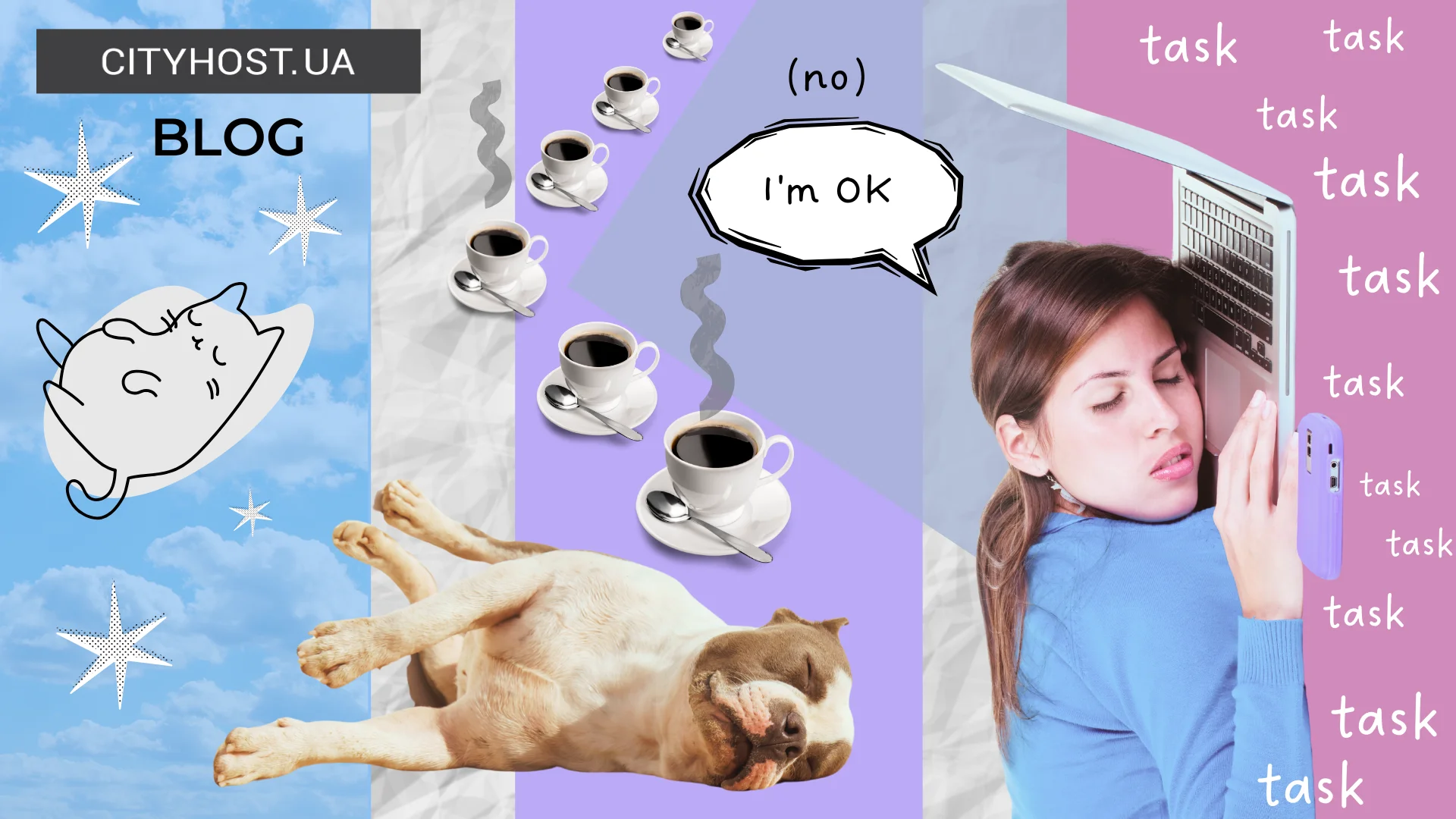
- Key Psychological Causes of Burnout
- 5 Signs of Professional Burnout
- How to Prevent Burnout at Work: Rules for Treating Yourself with Care
- What to Do If Burnout Has Already Happened: Emergency Self-Help Measures
Burnout is a state of exhaustion characterized by constant fatigue, loss of motivation, and a negative attitude toward oneself and others. It arises from prolonged stress and overload, particularly at work or in other areas of life.

Optimize and simplify website administration by ordering a domain name and hosting services from Cityhost. An intuitive interface, user-friendly control panel, and professional, positive technical support will turn your work into an efficient and enjoyable process.
Key Psychological Causes of Burnout
The main causes of burnout include an imbalance between work and rest, chronic stress, an inability to recover, and excessive self-criticism. A lack of rest and the fear of missing opportunities can exacerbate this condition, gradually impacting physical health as well.
If we dig deeper, the following categories of people are often prone to professional burnout:
- those with perfectionist tendencies and low self-esteem;
- those who experienced harsh criticism from their close environment during childhood or adolescence;
- those subjected to bullying and abuse in their childhood and teenage years;
- children from dysfunctional families where parents struggled with addictions — such as alcoholism, drug abuse, or gambling.
In adulthood, such individuals may adopt workaholism as a socially acceptable form of addiction (yes, workaholism is also an addiction). Their excessive self-demand drives them toward burnout, as they fail to recognize their achievements despite working harder than others. Inability to relax, prohibition of laziness and rest, and constant comparison with unattainable ideals of success push these individuals into a relentless, exhausting race. They derive their sense of self-worth solely from their accomplishments and cannot accept themselves without evaluating their productivity. Their motto is: If nothing was achieved today — the day was wasted.
If you see yourself in this description, it might be time to consult a psychologist or psychotherapist, as the behavior leading to burnout often masks unresolved traumatic experiences.
Of course, not all people who work hard suffer from the problems described above. Some simply love their work, have abundant energy, and need an outlet for it — they work so intensely that "smoke flies". However, they maintain a healthy attitude toward themselves, drawing energy from the enjoyment of their activities, and know how to rest and relax. In contrast, those psychologically prone to burnout turn work into a tool of self-aggression and self-destruction.
It is also important to consider people who experience burnout situationally. In general, they do not have the self-destructive habits of a workaholic, but they find themselves in circumstances that lead to severe exhaustion. For example, this can include individuals facing challenging life situations, such as working multiple jobs due to financial necessity, caring for children or ill relatives alone, or enduring more physical strain than they can handle. For them, this is a forced situation that may be alleviated by seeking help from others.
However, today we will focus more on burnout caused by a person’s life position, psychological scripts, and behavioral patterns.
Burnout differs from regular fatigue in that it does not go away after rest. Fatigue is usually temporary, while burnout gradually accumulates due to prolonged stress, affecting both emotional and physical well-being. In a state of burnout, a person loses interest in work and life, becomes cynical, and is less productive, whereas ordinary fatigue does not entail such profound changes. The danger of burnout is that, without intervention, it can lead to serious health problems and interpersonal conflicts.
Read also: How to self-organize in remote work
5 Signs of Professional Burnout
The main signs of professional burnout include:
- Exhaustion;
- Lack of motivation;
- Negative emotions;
- Conflicts at home and work;
- Health problems.
Exhaustion in professional burnout manifests as constant fatigue that does not go away even after rest. A person feels they lack the energy to complete daily tasks, leading to a sense of emptiness. Emotionally exhausted individuals may lose interest in work and life overall, finding it difficult to enjoy even familiar pleasures. Mental exhaustion leads to problems with focus and decision-making, further complicating productivity. Physically, it can present as weakness, powerlessness, or even frequent illnesses due to a weakened immune system.
Lack of motivation during burnout appears as a reluctance to engage in work, even if it once brought joy. The person loses enthusiasm and no longer finds meaning in their tasks. Waking up with the thought of going to work becomes a challenge, and every workday feels burdensome. Even routine tasks seem overwhelming, requiring considerable effort to complete. This feeling gradually undermines not only work performance but also the individual’s overall well-being.
Negative emotions during burnout arise from the feeling that your work has lost all meaning. A person becomes disappointed in themselves, their efforts, and even in the results that previously brought joy. Persistent pessimism infiltrates every moment at work, even if this was uncharacteristic before. Negative emotions, which everyone experiences occasionally, become regular and prevent you from enjoying even small victories. These feelings are draining and amplify the overall sense of dissatisfaction with life.
Regarding conflicts at home and work, the following should be noted. Burnout can manifest in two different behavioral forms. The first is frequent conflicts, which usually arise for objective reasons but could otherwise have been avoided or resolved calmly in different circumstances. Irritability, which is characteristic of a person experiencing burnout, often becomes the cause of such conflicts.

The second form is avoiding communication, where you become less open both to colleagues and loved ones. Even while being physically present with people, you may appear detached, as though your thoughts are elsewhere. This isolation only exacerbates feelings of alienation and exhaustion.
Chronic stress can have a significant impact on your health over time. It often leads to digestive issues, affecting the body’s overall condition. Stress can also provoke cardiovascular diseases, which pose a threat to life. Other common consequences include depression, alcohol abuse, and weight gain associated with using food as a way to cope with negative emotions. All of this underscores the necessity of responding promptly to stressful situations.
How to Prevent Burnout at Work: Rules for Treating Yourself with Care
To overcome professional burnout, it’s important to first acknowledge that you’re experiencing it and that your work process needs adjustments. This can be challenging if you’re accustomed to constant workloads, but recognizing the problem is the first step toward solving it. The best option is to create some distance from work, even if it’s just a short break or a day off, to give yourself time to restore energy and reduce stress. Focus on completing one task at a time, rather than trying to tackle everything at once, to avoid overload.
It’s also important to reassess your work goals and responsibilities to understand:
- which tasks are truly essential;
- which tasks can be delegated or postponed.
Give yourself the right to rest and recover — set aside time for sleep, physical activity, or simply relaxation, even if it’s just half an hour a day. Changes in your approach to work, such as reducing multitasking and concentrating on the most important tasks, can significantly lower burnout levels.
It’s crucial to learn to let go of control and trust the people to whom you delegate tasks, resisting the urge to check everything multiple times or influence every process.
Another cause of burnout is the inability to say no — to yourself and to others — which leads to an accumulation of tasks and requests. Learn to say “no” and distance yourself from tasks that aren’t essential for you. Establishing personal boundaries is vital, as it protects you from pushy people who take advantage of the goodwill of acquaintances or colleagues.

If managing on your own is difficult, seeking help from a psychologist or professional coach can help you find ways to recover and maintain balance between work and personal life.
Read also: How to master delegation and stop doing everything yourself
What to Do If Burnout Has Already Happened: Emergency Self-Help Measures
When you notice the main symptoms of burnout at work, the first step is not to ignore the problem. It’s important to talk with your manager or colleagues to analyze the situation and find compromises or solutions. Identify which tasks can be postponed or delegated to reduce your workload. Don’t forget about the support of family or friends — a conversation can significantly ease your emotional state.
During the acute phase of burnout, the best solution is to take a vacation and completely disconnect from work — get plenty of sleep, rest, and simply do nothing.
Learn to "leave work at work" — avoid working overtime without critical need, refrain from addressing work-related issues late at night, and allow yourself to set boundaries with clients, asking them not to call during weekends (this is especially relevant for freelancers).
In parallel with work, take care of your physical health — regular walks, outdoor activities, healthy sleep, and proper nutrition will help you regain your strength. Systematic rest is also essential: take short breaks to recharge and relieve tension.
Find a hobby that allows you to step away from work and enjoy yourself. Practice self-regulation through meditation, yoga, or other methods to reduce stress and restore emotional balance.
Professional burnout is a reversible process, and it can be overcome by making certain changes in the work environment. It is important to focus on professional development, maintain motivation, and seek out a team with a friendly atmosphere. Proper prioritization and rational workload planning help prevent excessive stress. In some cases, it may be helpful to approach management or change jobs if the situation does not improve.
Regular breaks, physical activity, healthy sleep, and proper nutrition are crucial elements in combating burnout. However, a vacation alone will not solve the problem unless other measures are taken to restore balance. It is important to find self-care strategies and seek professional help if the situation worsens and you experience signs of mental disorder. Decisions regarding treatment and support will help more effectively cope with the consequences of burnout.










